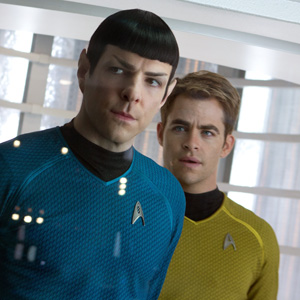

If you want a captain who double-teams twin alien chicks (they have tails, a la Avatar) and who’ll get into senseless fights with prisoners who have already surrendered, Capt. James Tiberius Kirk is your man.
Chris Pine’s resemblance to our Shatner is mostly physical, a baby-faced thuggery; he’s more lowdown, and he has motorcyclist’s hooks to the cut of his sideburns.
There’s no Shakespeare in him, though, as there was in the Shat. Pine’s Kirk is made out of almost pure proactiveness. Ultimately, the enjoyable sequel to the highly enjoyable reboot doesn’t show Kirk growing, no matter how the film assures us that he is growing.
God bless him, Kirk is impulsive. The capacity for self-sacrifice is strong—from a reverse angle, Star Trek Into Darkness replays the single most powerful moment in the Star Trek movie series. But Kirk’s consistent refusal to follow directions is always ultimately applauded as his greatest strength, and never here as the true weakness it can be in the military and in real life.
As a fantasy, the film moves along: visual density is kept up with flying debris, contrails in space and director J.J. Abrams’ trademark lens flares. If the Enterprise had zoomed past a black hole, Abrams would have given it a prisming shaft of spreading light.
But like the show that foaled it, Star Trek Into Darkness is earnestly trying to be about something—you can understand the reason it’s dedicated to the soldiers who serve in the War on Terror, because it could easily be peacenik-baited.
Like Iron Man 3, Star Trek Into Darkness is nicely transparent allegory about overreaction to a terrorist act. The plotting gets unlikely—sometimes it seems the Enterprise is trying its best to fly right into a hostage situation. But the film gives the villain the benefit of a reason. You always feel like you’re watching a smart movie if the villain is someone who didn’t just wake up on the wrong side of the bed and decide to become a terrorist that day.
He is called John Harrison (Benedict Cumberbatch). He cold-bloodedly commissions the suicide bombing of a London archive. The sequence is thoroughly effective, from the picking of the victim to the reveal of Cumberbatch’s startlingly feline face to the ingenious way in which the destruction is carried out.
Harrison then flees to the one planet from which he cannot be extradited. Kirk, Spock (Zachary Quinto) and the vaudeville-accented gang fly to the planet to pilot (essentially) a drone strike. The legalities of drone strikes cause a rift in the crew, some of whom feel Harrison must be brought to Earth and given a trial.
So there is some chewiness here in between battleship broadsides and a starship crash right into downtown San Francisco, including a warp-speed dog-fight that is short but rousing—do the crew thrown from the blasted holes in the starship’s bulkheads into the time streams end up literally thrown into next week? The big reveals, of political skullduggery and Harrison’s identity, are spoilers one hopes can be guarded for a week or two.
The script seems to have been retrofitted with women. Not counting the alien chicks, there are three. Zoe Saldana’s Uhuru gets at least one opportunity to almost save the day, but mostly she ends up in a women-are-from-Venus, men-are-from-Vulcan situation with Spock. There’s a blonde semistowaway (Alice Eve, and if the name sounds fabricated, that’s the way the actress looks).
Most baffling, there’s a bald, lipsticked androgyne, a red-shirted lieutenant who keeps catching our eye but who is other unexplained. I’m now as intrigued in who s/he is as the Star Wars fans were with Boba Fett.
Speaking of crying games (if that’s what’s going on), when you watch a franchise that you’ve been watching since you were old enough to have eyes, it’s impossible to watch with completely clear eyes.
Sometimes J.J. Abrams and the three credited scriptwriters overdo the attempts to get you to fog your 3D glasses. The best of these tear-pumpers are the simplest: the passing mention of a starship called the USS Bradbury, or Kirk helplessly extending his arm to a crewman falling past him to his death.
The bigger emotional climax is, sadly, mush. To make it plain: I want to be the weakling who snivels when Spock looks manfully at Kirk, barely concealing his emotions. I don’t want to watch them snivel at each other.
Quinto is a really odd duck of a movie star—a pale Poindexter, an overexplainer so pedantic you feel for him. (Karl Urban’s beautifully ornery Bones McCoy has just expressed the fact that damn it, he’s a doctor, so Spock has the most dud line in the movie: “The fact that you are a doctor is why I need you to listen carefully.”)
I loved the way Spock dropped his jaw a little when Kirk declares his friendship, as if what the captain had said was shockingly indecent. When Quinto’s Spock and Pine’s Kirk look at each other, it’s clear there could be no other serious affection in each other’s lives: the prophecies in the slash fiction are fulfilled.
These reboots are a fight between market forces, between what a friend dismissively calls “gamer crap” and the sturdy roots of the Trek mythos, whose lifeblood (and sap) come from 20th-century moviemaking.
The tensions resemble the same quarrel between military ardor and technical expertise played out in every giant-insect movie ever made; eventually, the white coats and the top brass patch up the differences between them over the bodies of the dead alien invaders.
Maybe I’m being too hard on the Captain. Kirk is still essentially out of control when the movie ends, but maybe, just maybe, he’s beginning to see the light of logic. No, probably just another lens flare.
132 MIN PG-13


